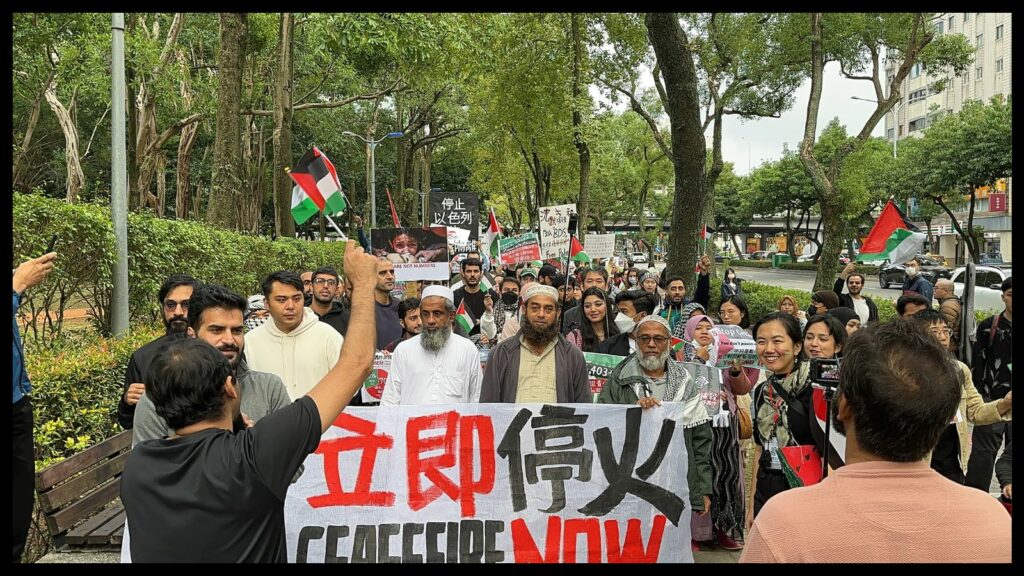[embedyt]https://www.youtube.com/watch?v=0amZlRWH18Q[/embedyt]
In late November, an emergent network named “For Peace Taiwan” (可以自由巴) organized two solidarity events for Palestine in Taipei. I was the emcee for both events. The first event was on November 21. The second—a rally on November 25—attracted around eight hundred local and international attendees. The rally featured speeches, artistic performances, an open mic session, and a march around Da’an Park in Central Taipei. A majority of the participants were from Muslim communities in Taipei, and a few of them also gave speeches. Some Palestinians participated in the rally, and most of the local Taiwanese participants were young people. We chanted slogans like “Ceasefire Now,” “End the Apartheid,” “Free Palestine,” and “End Genocide.”

The two events did not attract significant media attention, nor were we able to engage with the Israeli Representative Office in Taipei, who marked us as ignorant student activists who “did not condemn Hamas” in their official reply to our mobilization. But speaking as the emcee, I do believe that these events provided an important platform to bring together some local Taiwanese activists and a marginalized, and often invisibilized, Muslim and Palestinian community in Taiwan to build solidarity and find solace together.
The Taiwanese Left is weak and scattered, so it was significant that these two events provided a rallying point for the Left, while marking the first time in recent memory that discussions about Palestine actually turned into activist engagement with Palestinian voices in Taipei. Despite the informal and hasty manner in which we gathered, activists from different social movements and backgrounds, including artists, human rights organizations, anti-imperialist collectives, and queer organizers, were able to come together. This emergent coalition proves that bringing the local Left and Palestinian migrants together is, indeed, possible.
As an ethnically Han Taiwanese person born and raised in the settler-colonial state of Taiwan, which has been described as “the next geopolitical flashpoint,” I find that organizing these events helps provide an alternative to a few dominant modes of politics. It rejects the ruling party’s strategy of aligning with U.S. imperialism and other authoritarian regimes like Eswatini (formerly Swaziland), exemplified by the Tsai Ing-wen administration’s ties to King Mswati III and Taipei 101’s visual tribute to former U.S. Secretary of State Mike Pompeo in the past. We cannot equate these struggles, but still, the events provided an opportunity for many Taiwanese people to see parallels between Chinese colonial claims on Taiwan (“keep the island, kill the populace”) and Israel’s treatment of Palestine.
While the U.S. military-industrial complex plays a key role in funding Israel’s genocidal operations, it is also necessary to remember that the China-Israel technology exchange has helped strengthen authoritarian surveillance infrastructures in Palestine. These insights point us toward a horizon of genuine internationalist solidarity, one that defends the right to self-determination for everyone from Ukraine to Hong Kong, from Tibet to Palestine.
In these turbulent weeks, I am constantly reminded of my trip to the Socialism Conference in Chicago earlier this year, and the glimmer of hope I felt there: a hope that true solidarity can be built, and that a better world is, indeed, possible; a world that can bridge struggles for democracy in Taiwan and Palestine; a world where we reject campist politics that leads those to see the enemy of my enemy as their friend; a world where people dismantle empires, be it an empire often labeled as the leader of a democratic world order or one falsely seen as a bulwark against the capitalist West.
I am not an optimistic person, especially when I think about the looming climate catastrophe and the global rise of fascism. But witnessing the growth of Taiwanese solidarity with Palestine, I see images of a new world. I hear the future echoes of broken chains. I feel the heat of empires burning up in flames. I tangibly remember what radicalized me in the first place—the coming future of friendship, joy, love, liberation, and power.
Follow “For Peace Taiwan” on Facebook and Instagram at @forpeacetw.

